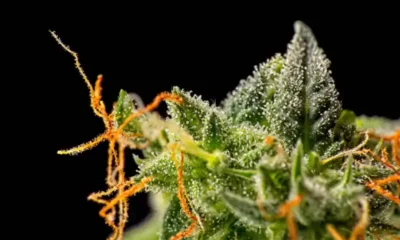Connect with us
Published
2 years agoon

While British Columbia was always a mecca for cannabis enthusiasts and growers—even before it became legal for adults in Canada back in 2018—industry advocates say that, despite this long-running battle for legitimacy, the cannabis industry isn’t flourishing as much as they would have hoped, according to a Yahoo! News report.
Marshall Anselmo of Grass Roots, a Vancouver Island company marketing exclusive strains of cannabis, said that policy hurdles often hinder the ambitions of small craft growers and additionally stifle the long-standing legacy of B.C. cannabis. He said there was a “lot of hype, hopes and dreams” surrounding legal cannabis, especially as he helped to showcase growers before legalization and set up farms with medical licenses. Anselmo added, “There’s a lot of growers still in the weeds, waiting to see how things will turn out.”
David Hurford, secretary of the BC Craft Farms Co-op, said that, despite the competitive advantages of B.C., the West Coast’s small-batch growers simply can’t access the market. The province has 6,500 medically licensed growers, though just a fraction have transitioned to a recreational market because of the regulatory and license regime which, Hurford said, favors big corporations with greater financial means. “We have the best farmers in the world, and they are being shut out,” he said. “Everybody wants B.C. craft cannabis products, but the federal government has only approved 60 licenses in the first three years of legalization.”
While the federal micro-cultivation license was made to encourage small farmers to access the market, allowing for the product of 200 square meters of cannabis, the risk and price tag surrounding licensing applications are immense, Hurford said, with growers unable to make a return given their means.
Anselmo agreed, calling it “a lot of upfront risk,” as it can cost $500,000 to $1 million to apply for a license with no guarantee of approval. In addition, cannabis prices are declining and the cost of property in B.C. is rising, both of which work against these small growers, Anselmo said. In addition, he said craft growers don’t have direct access to consumers who are looking to buy local quality cannabis from growers they know, but they did prior to legalization.
Hurford noted that craft growers must use the BC Liquor Distribution Branch as the intermediary to get their products to retailers at prices that are often not sustainable. Should a grower want a direct line to customers, they have to apply for separate, distinct federal licenses to process and/or sell their products, which is an additional expense many growers can’t afford.
“It’s so overly regulated, it seems built to fail,” Hurford said. “It wasn’t designed with craft farmers in mind, and there seems to be some bias in the system against them.”
The BC Chamber of Commerce recently released a report calling for changes that would boost consumer access, lower regulatory costs and taxation and design markets aimed to “unlock” the B.C. cannabis sector’s potential. Additional suggestions include allowing cannabis retailers to opt in for delivery services, like Uber Eats or Skip the dishes. They also called for B.C. to speed up the farm-gate program designed to boost agri-tourism in rural areas and allow small growers to market directly to customers, like successful wine or craft brewery markets can.
The report also notes B.C. should work with Ottawa to lower the high cannabis taxes, basing them on the percentage of sales rather than pricing by gram. Anselmo said the high rates were designed with an influx of money in mind that, in reality, isn’t coming in. While prices have gone down, the taxes stayed the same, he said, adding that the grower pulls the least profit from their produce in the supply scale.
In that vein, Anselmo said that Ottawa should consider taxing at scale, referencing the fact that small micro-growers are taxed at the same rate as multimillion-dollar corporations.
While the province promised it will roll out the farm-gate program in 2022, Hurford said it should have been rolled out sooner. Hurford posed, “How many opportunities have we missed, especially in rural B.C. where it’s been such a difficult year?”


Despite City Efforts, Hemp Shops Posing as Dispensaries Prevail in Las Vegas


Cannabis Community, Investors React to DEA Decision To Reschedule


Georgia Governor Signs Bill Establishing Licensing Requirements To Grow Hemp


Study: Psilocybin Enhances Meditation


Ohio GOP Lawmakers Debate Adult-Use MJ Priorities, Eye June for Regulation Approval


Taylor Swift Puts Narcotics Into All of Her Songs on ‘The Tortured Poets Department’
